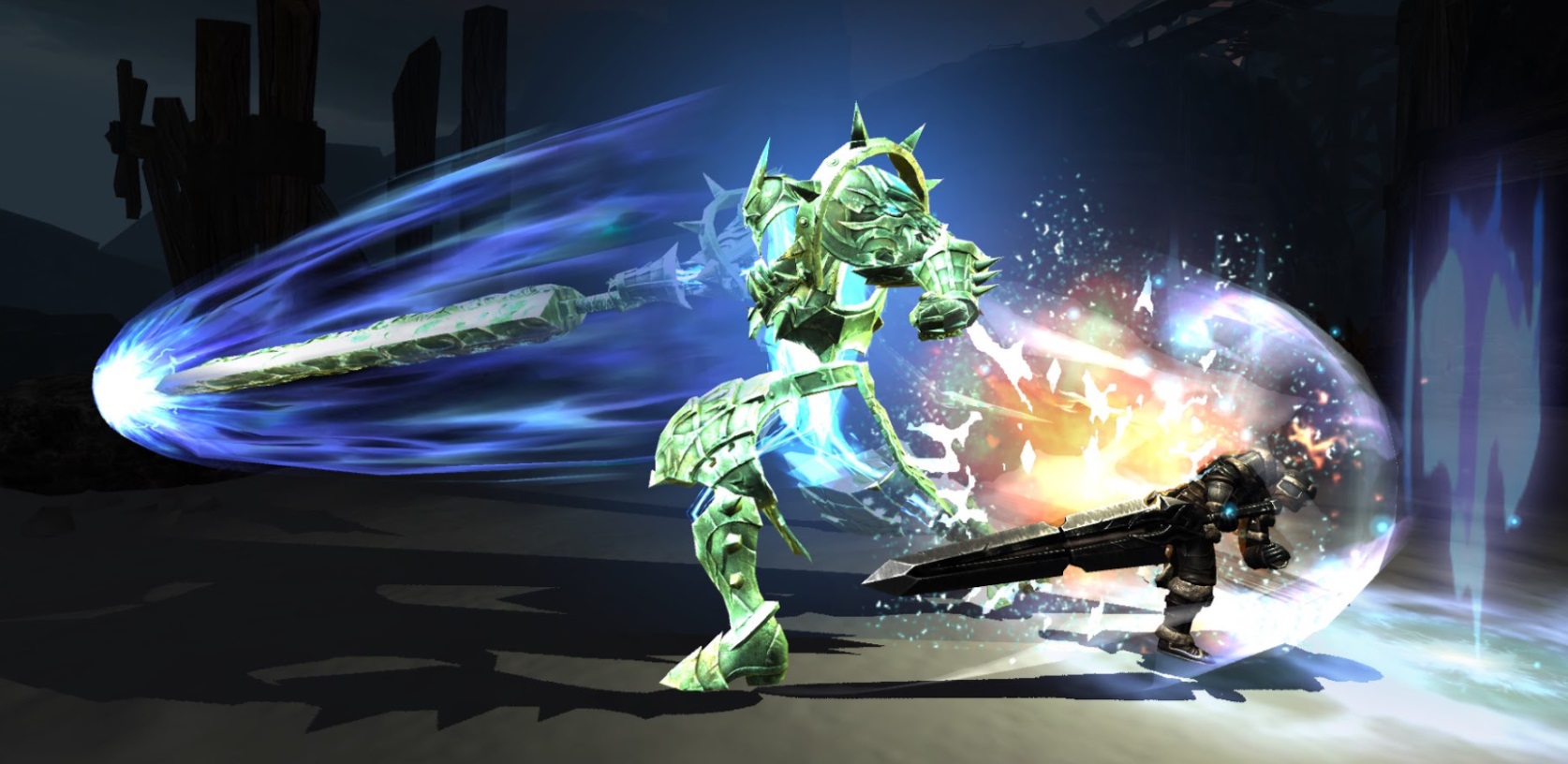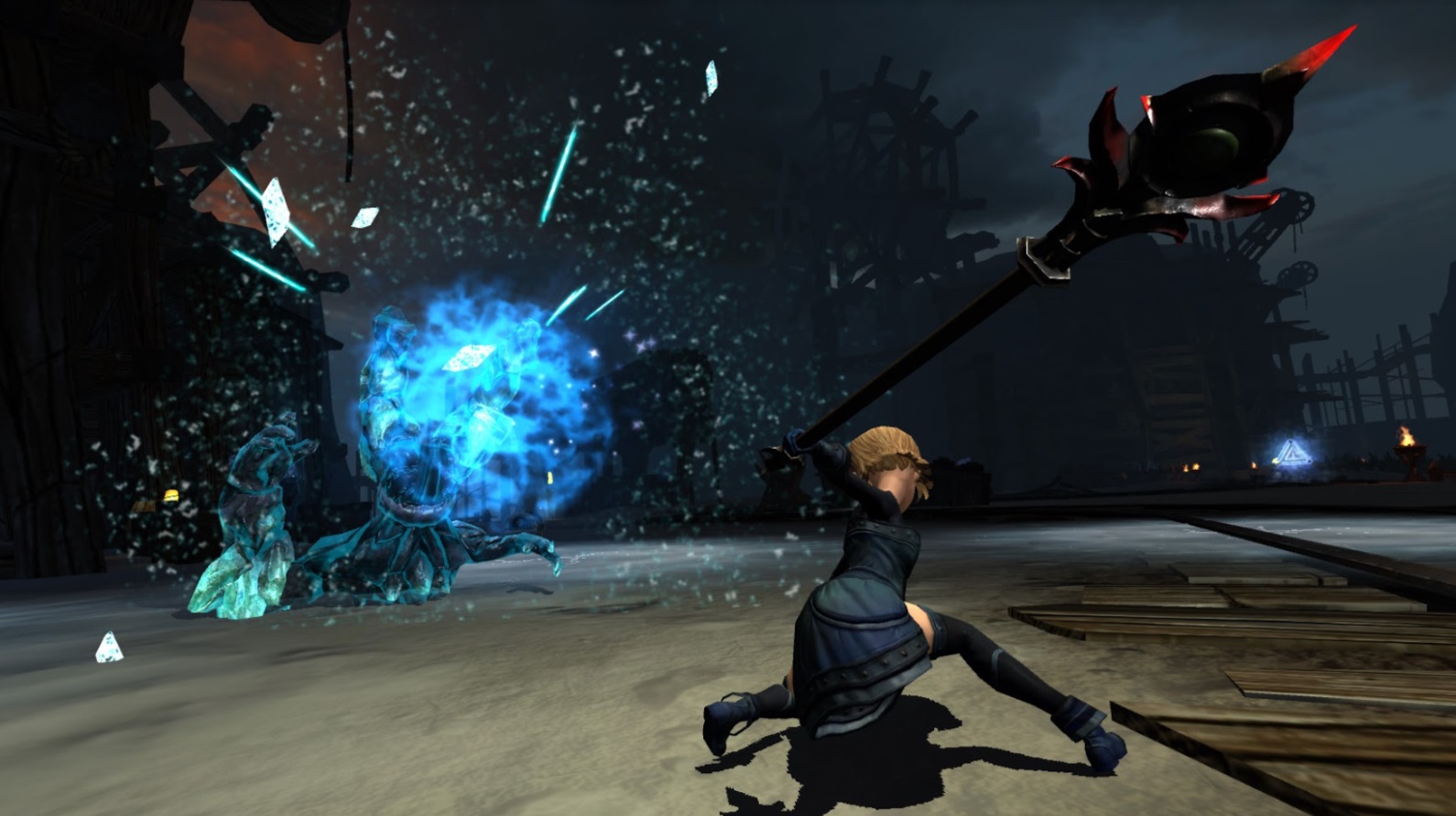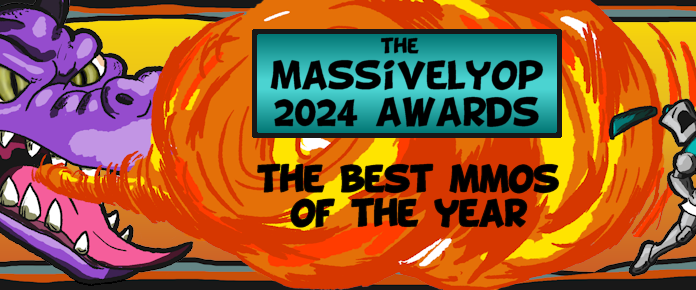
I have a love-hate relationship with VR. I’ve bought an Oculus Rift and the Touch, but don’t play it much these days. Part of it’s because my college stuff and Japanese stuff are crammed into a small space with my PC, so I can’t take advantage of certain features, but it’s also because the games aren’t very complete. VR can give you some really cool moments, but most of the time, the games are what you’d get on your PC or console, just in your face, and maybe with a few sides of motion sickness and virtual molestation.
Preta: Vendetta Rising is not revolutionary. It’s not even exclusively a VR title, being cross-platform from mobile to PC. The early animations and voice acting don’t emotionally resonate yet; most of what I saw would have been bland if it wasn’t for the fact that this was specifically a VR demo. That being said, developer Illion and game developer JJ Baek are incredibly sensitive to VR’s largest issues, from women in VR spaces to developing content based on consumer realities rather than developer dreams.
General VR issues prior to E3 2017
Let me be upfront with you, readers: I didn’t expect anything from Illion or Preta. Readers probably noticed that VR wasn’t the focal point at E3 the way it has been in the past. I may have paid for VR, but mostly as a tool, something to research a bit. While the tech seems useful for education and immersion, games are very much lacking. AltSpace feels like general-chat with minigames, Eve Valkyrie is still fun in short bursts, The Unspoken works as a good motion-control starter until you realize Nintendo should have been doing it, and The Time Machine is one of those actual games non-gamers can jump into and “get” VR with instantly, without risking motion sickness (so far).
For me, that’s about it so far, and it’s depressing, especially when you realize that most of your fellow players must be reasonably affluent but many are still trollish, partially because of unsupervised children with cash. My best VR moments so far have all been singleplayer. Forced voice chat, antisocial players, and the inherent issues of a motion sickness inducing headset are strong limitations for those of us who may be used to old-school MMOs that focused on community interaction rather than digital spectacle.
I actually played one game at E3 this year that aimed more for the hardcore crowd, Seeking Dawn, and while I can see how survival fans who want VR and sci-fi mixed, it broke some key VR rules that when combined with my pre-E3 work fatigue caused me to crash, hard – I was slammed with an appointment-canceling, vomit-threatening, “Can you Lyft down here and drive me home so I don’t get towed?” VR sickness that ruined my initial writing schedule. MOP editor Bree had initially told me to skip the rest of my VR demos, and I aimed to commit to that 110%, despite knowing that Preta had a demo to show me before my interview. I told Baek I’d have to pass when I met him, but talking to him, without his pushing at all, convinced me to demo it anyway.
Hidden gems
As I’ve worked with Asian VR developers before, I figured I’d be talking to another developer with huge dreams and unrealistic ideas about his audience, not to mention ignorance when it comes to Western press who dig into games and prepare questions before an interview. But Baek is not one of those developers.
As soon as I bring up motion sickness, Baek told me his team had scrapped Preta’s previously seen first person perspective, at least during most gameplay. It’s still there when interacting with NPCs, but it’s rather simple, being mostly just a way to get a better look at who you’re talking to. Anyone who’s played a non-first person VR game should immediately understand why this is significant, but for those who haven’t, imagine being given a video game without an input device. Maybe you keep score on a piece of paper and wait for the “game” to, I dunno, ask “players” trivia questions before giving them an answer. It feels like it defeats the purpose of VR.
However, I’ve also covered how current VR design is unintentionally sexist, and part of that has to do with the emphasis on first-person perspective, which is known for causing motion sickness for a variety of reasons. I’m not a game developer, just an amateur researcher, so I’m not sure I know how to fix the problem, but one temporary solution that can be used to negate this issue and welcome a broader gender spectrum into VR is to change those perspectives.
Illion tries to make use of 3-D sound in combat and limited first-person perspective with voice acting for NPC interaction, but it still feels like it’s missing. Using third person does create issues but is perhaps why Preta is going for cross-platform gameplay. More importantly, however, is how it’s used to develop the game. While cross-platform development often makes certain versions of the game feel like an afterthought, Baek has done his homework.
 VR, console, PC, and mobile gamers have their own different cultures, and that’s before you factor in that Illion’s headquarters are in South Korea. That being said, one thing his team decided to focus on is developing for mobile. While I’ve talked about it before, western mobile players have a different mobile culture than Asian players. However, it’s similar to VR players in that we tend to “snack.” While I know several enthusiasts go for regular gaming sessions, I’ve left people alone with my headset and they felt “done” in 15-30 minutes.
VR, console, PC, and mobile gamers have their own different cultures, and that’s before you factor in that Illion’s headquarters are in South Korea. That being said, one thing his team decided to focus on is developing for mobile. While I’ve talked about it before, western mobile players have a different mobile culture than Asian players. However, it’s similar to VR players in that we tend to “snack.” While I know several enthusiasts go for regular gaming sessions, I’ve left people alone with my headset and they felt “done” in 15-30 minutes.
Using the mobile and VR audience similarity gives Preta’s developers the ability to create something that hopefully will still be able to appeal to both audiences, and maybe include the console and PC crowd as well. For example, non-automated newbie quests take about 5-10 minutes, but even high-end ones should take 20-30 minutes. If players like, they can repeat more, similar to most lobby games, so in theory, Preta’s content should scale well. That being said, EVE Valkyrie is the same, and I don’t think I’ve felt the urge to play that again for at least six months. However, Preta will also allow high-end quests you’ve completed an option to be repeated automatically by your pets/minions and get the rewards for you three times a day, which reminds me of not just tons of mobile titles but sending my minions in Star Wars: The Old Republic out on missions too.
I can respect most developers as people, but few truly impress me as business people, especially since I worry about ethics and morality. VR has had some big problems with sexism both in and out of cyberspace. Raph Koster has noted how people in the VR/AR field often ignore the history of virtual crime (or even just virtual kink) that’s been present since MUDs, and seeing history repeat itself only makes the old saying about learning from the past a truism that’s painful to watch being played out in the VR scene. I suspect, however, that Baek and his team, being based in both the East and West, may be able to avoid some of that.
No, character models aren’t ordinary in ways that would turn off players who tend to enjoy the hyper-beautiful character models we’re used to in Asian games. However, in order to get around virtual perverts grabbing at your melons and hotdogs, Preta has made the game’s towns single-player only. That does mean less direct player interaction, and that sucks, but does mean that even if the game re-adds motion control that utilizes your hands, you have to try to grab your fellow player during what’s essentially a raid, probably resulting in the molester’s death.
Baek’s also mentioned that, while the game’s only current input is voice chat, “if communities ask for [voice modulation to help disguise/change the user’s voice, he] can develop it.” Not only would that allow for more roleplay options should Illion decide to open social spaces, but (again) would work as an option for welcoming a broader audience to the game, especially as the team’s already ensured that people can leave voice-recorded vendor barking messages with their items on the auction house, something I’ve never heard a multiplayer VR game adding. It’s a nice callback to old-school MMO trading before we had trade chat channels and auction houses. It’s unnecessary, as players can still see the stats on the items, but it’s a nice way to make VR still feel relevant, even if it takes advantage of a peripheral feature of VR headsets.
I enjoyed talking with Baek, but I know developers and PR aren’t always forthcoming, and of course they love their projects. I check again about the motion sickness among testers, and he repeats that there are no complaints. Again, I’m not a VR newbie at all. I know from theory and practice what will and what won’t cause motion sickness. Seeking Dawn, which was fun enough, asked me to constantly move around, to run rather than teleport, and especially when you’re in first-person perspective, that’s barf city, even if you’re having fun. Preta wasn’t going to ask me to do that, with my headset making me the camera, not the player. I told Baek that I’d give his demo a try, despite my earlier VR crisis, and that the moment I sensed motion sickness, I’d take it off. That sickness never happened, though.
Theory and reality
My demo used the Oculus Rift and an Xbox One controller. As Baek promised, there was no motion sickness. The game looked and played like a generic action game with my warrior having real-time dodges, charging, blocking, special attacks, and ultimates. My immediate thought was this wasn’t a game that needed VR and that outside of VR, it’d be basic at best, showing that the team could show off the form of the genre but maybe not get any heart. The 3-D sound was nice enough, but again, VR is about perspective. If Baek’s only requirement was to make a VR game that would avoid most VR mistakes, he had achieved it. That being said, it disappointed my VR thrill in the same way Lucky’s Tale had when I first got my own Rift.
Unlike Lucky’s Tale though, it didn’t remain completely generic. While I was only playing a demo and wasn’t impressed with how the game’s animations and voice acting weren’t matching, I was struck by the narrative techniques. The game has a single-player story like other multiplayer-optional games, and it’s linear at that, but it plays with that aspect. The female character with child was obviously distressed by the fact that I was following her, an option forced on you by the game’s linear design.
Because the game’s in first person during these scenes and she sounds horrified (though doesn’t look it), I felt kind of a like a bad guy. She says certain things about your character that certainly don’t make you feel like a hero, but at the time, don’t make sense. It’s only when you get to the boss where you realize, yes, she does have a reason to be afraid of you, that there’s something else going on in the story.
Again, the presentation isn’t flashy. Most of the mechanics are essentially by-the-book design. What Illion’s done is sanitized the typical VR experience while trying to innovate mobile, console, and PC so they all fit together well enough, and it works on that level. The camera movement doesn’t rotate in real time, but that’s to prevent motion sickness, which (again, in my hyper-weakened state, even caused The Crew 2 to trigger it a few times even in third person view), never happened.
The team could make some tweaks before its early July release on VR platforms (PS4 and non-VR Steam are set for later), but I’m not expecting an overhaul of what I saw. If you need a multiplayer VR game that won’t make people sick, Preta: Vendetta Rising is looking like a good choice, especially if your friends come in genders other than male. It feels standard enough, but there’s at least a little something bubbling beneath the surface, and it’s being made by a company that I already want to see more from. In fact, if I were teaching a class on VR development, I’d probably have them start with Preta and innovate from there, not because the game is perfect, but because the design seems solid, gender-accessible, and ethical, all points the VR industry as a whole really needs to focus on.















